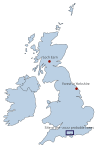Tick-borne encephalitis: from tick surveillance to the first confirmed human cases, the United Kingdom, 2015 to 2023
- PMID: 39916608
- PMCID: PMC11803743
- DOI: 10.2807/1560-7917.ES.2025.30.5.2400404
Tick-borne encephalitis: from tick surveillance to the first confirmed human cases, the United Kingdom, 2015 to 2023
Abstract
BackgroundTick-borne encephalitis virus (TBEV) is a flavivirus spread by ticks and can cause tick-borne encephalitis (TBE) in humans. Previously, TBE has been reported in returning travellers in the United Kingdom (UK), but in 2019 and 2020, two probable cases of TBE acquired in the UK were identified.AimThe aim of this study was to investigate TBE cases in the UK between 2015 and 2023, describing the incidence, place and mode of acquisition and diagnostic process.MethodsA retrospective review of possible, probable and confirmed cases of TBE diagnosed by the Rare and Imported Pathogens Laboratory (RIPL) between January 2015 and December 2023 was performed. For cases identified in 2022 and 2023, clinical data were collected for enhanced surveillance using structured case record forms. Laboratory diagnosis is reviewed and described.ResultsWe identified 21 cases: three possible, seven probable and 11 confirmed cases. Of these, 12 were between January 2022 and December 2023: three possible, three probable and six confirmed cases. Two confirmed TBE cases had definite or highly probable acquisition in the UK, in June and August 2022, respectively. One of the possible cases had definite UK acquisition. Cases typically have a biphasic presentation, with encephalitis in the second phase.ConclusionClinicians should be aware of the possibility of TBE when the cause for encephalitis is not identified, even in the absence of travel to previously identified endemic regions.
Keywords: Tick-borne encephalitis; Vector-borne disease.
Conflict of interest statement
Figures
References
-
- United Kingdom Health Security Agency (UKHSA). HAIRS risk assessment: tick-borne encephalitis. Qualitative assessment of the risk that tick-borne encephalitis (TBE) virus presents to the UK human population. London: UKHSA; 5 Apr 2023. Available from: https://www.gov.uk/government/publications/hairs-risk-assessment-tick-bo...
MeSH terms
LinkOut - more resources
Full Text Sources


